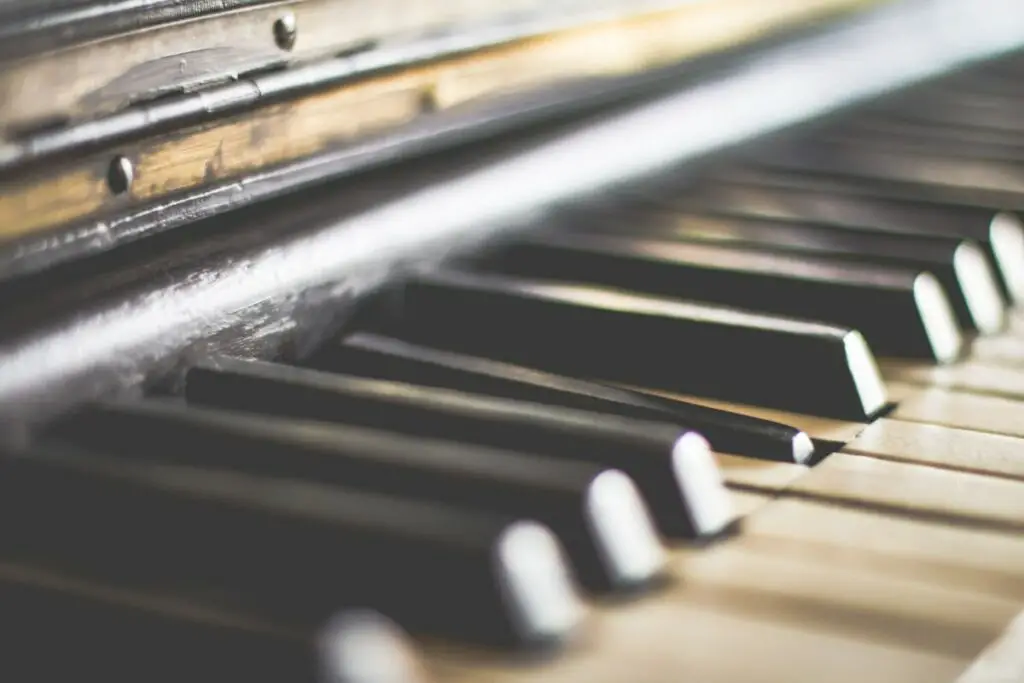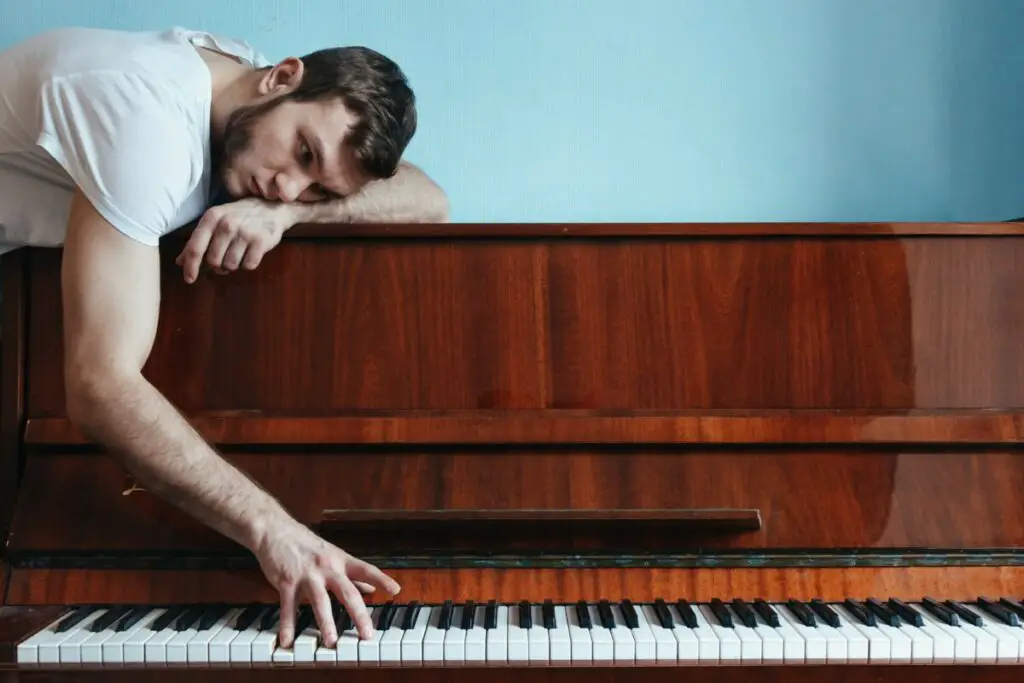This post contains affiliate links.

You probably already have or are thinking of getting an untuned piano. Regardless of whether you got it from a friend or family member, or got it from craigslist or Facebook marketplace, there are a few things you should know about your piano and how it being untuned could potentially affect you as a pianist.
Playing an untuned piano can damage your skills as a pianist, especially for beginners. Besides getting annoyed at hearing the wrong notes, an untuned piano can develop a false sense of pitches in the notes which could impact your skills as a pianist later down the line.
This article will explain the reasons why playing an untuned piano can be bad and answer some common questions regarding tuning like what causes the piano to go out of tune in the first place, is it worth getting a professional tuning service and is an electric keyboard better than an untuned piano.
Why you shouldn’t practice on an untuned piano
Annoying to hear wrong notes despite hitting the right keys
Nothing is more annoying and disheartening than when your playing of a piece doesn’t quite match up with what it’s supposed to sound like despite hitting all the right keys, just because your piano is out of tune.
Hinder your progress as a pianist
While you can learn how to hit the notes correctly even with an untuned piano, there is more to playing the piano than just hitting the correct keys. When you listen to piano recordings or watch piano competitions, the melodies pianists produce are never the same, some are soothing and sweet, while others are intense and rich, but they are all imbued with emotions. You can tell the feelings of a pianist by just hearing them play the piano.
The way to imbue emotions into your playing is through expressive playing, which depends on how hard or soft you hit the keys, getting the tempo right and also engaging the pedals at the right moments. This takes a lot of practice, and you gradually learn how to give the notes the right amount of touch.
However, an untuned piano will lengthen this process and slow down your progress by producing sounds that match neither your expectation nor what it’s supposed to sound like.
The sound a piano produces also acts as a teacher giving instant feedback to its student, identifying your mistakes so you can improve on making it better. An untuned obviously won’t be a very good teacher by that standard!
Make it harder to transition to a tuned piano
Playing an untuned piano also makes it harder to transition when you do decide to tune the piano or get a new one since your sense of pitch for the notes is all over the place.
It will take a lot of your time and efforts to relearn or adjust a lot of skills you gained compared to if you started out playing a tuned piano. For example, the pedalling to suits your untuned piano may not work with a tuned one, and you’ll have to spend time on fixing it.
Damage to the piano itself
Not only does playing untuned piano damage your skills, but it can also damage the piano itself. The longer the piano is left untuned, the harder it is to keep the piano in tune when you decide to tune it.
This is because when a piano is left untuned long enough, its out-of-tune state will become its default state. This means instead of needing to tune once per year for an average well-tuned piano, it’ll be once every 3-4 months since the piano will keep returning to its out-of-tune default state. This will keep going until the piano is used to its new tuned state.

Why do pianos go out of tune?
Environmental factors
The two biggest enemies of a piano are temperature and humidity.
Humidity is the amount of water in the air in the form of water vapour while temperature describes how hot or cold the climate is.
Usually, a change in temperature means also a change in humidity, although it may not be the case all of the time. Nevertheless, a piano’s reaction to sudden changes in temperature is similar to sudden changes in humidity.
In both too damp and dry environments, or when there are wide fluctuations in humidity, the tuning pins holding the strings become loose, unable to hold the string tension, causing the piano to go out of tune.
Time
As you play the piano, it slowly and naturally goes out of tune since for example, playing the piano loudly can make the piano more sensitive to humidity change, and the components are ever so slightly knocked out of place when being used. The more you play, the faster the piano goes out of tune.
Moving
Moving a piano from place to place causes a piano to go out of tune. This is because the piano is moving through different environments: from inside your house to the outside, then inside another building, meaning there are fluctuations in both temperature and humidity.
The components inside the piano rattle and are knocked out of place when being moved.
These are why it is recommended to tune the piano after moving it to a new place.
How to know if a piano is out of tune
Is there a twang or buzzy sound when you hit a key? Each key on the piano is connected to 3 strings inside the piano, along with a hammer to hit those strings. If one of the strings is off, this sound is produced.
If you’re still not sure if your piano is out of tune, play a piece and compare it to recordings of it. If you suspect something is wrong, then it’s time to tune the piano.

How often should I tune the piano?
Generally, pianos go out of tune after one year, and this is a gradual process, so you won’t be able to notice it. Thus, most pianos need to be tuned once per year.
This rule changes when you live in more extreme environments – too hot, too cold, sudden changes in temperature – or if your piano hasn’t been tuned in a long time. In these cases, your piano may need to be tuned once every 3-4 months.
Consult a piano tuner to know exactly how often your piano needs tuning.
Can I tune my piano by myself?
You can, but you really shouldn’t. People go to schools to get certifications to be able to tune pianos. Not to mention tuning pianos is very experience-based, the more pianos you tune, the better you are at identifying the correct pitches to tune the piano to.
Furthermore, tuning is an incredibly tedious process. A piano has over 200 strings, 3 for each key with some keys only need 2, and you have to tune each and every one of them. In addition to that, all the strings are different from each other since they correspond to different keys on the keyboard.
So it’s better to not cheap out and let the pros handle this. You’ll be saving yourself precious time and potentially a lot of headaches and frustrations.
How much does tuning cost?
Usually, a tuning service cost around $100. Of course, this depends on which city you’re living in, the price will be cheaper in more rural areas, while it’ll be more expensive in bigger cities, though you’ll have more options to choose from. For example, in the city I’m living in – Vancouver, Canada – it cost around $150 CAD for tuning service.
The cost also depends on the condition of your piano, a regularly tuned piano will cost less to maintain compared to a piano left untuned for a long time.
To get an accurate picture of the cost, call a pro to take a look at your piano. Some piano tuning providers offer free price quotes!
Electric keyboard as a substitute
If you’re not on a tight budget, consider getting an electric keyboard rather than practice on an untuned piano.
Although the sound may not be as rich as an acoustic piano, electric pianos offer the correct pitches to the notes – which is the more important factor, along with the ability to sustain using USB pedals, with some models even have weighted keys to give you the closest experience to a real piano.
If you are contemplating whether to get a piano pedal for your keyboard, check out Why You Need a Pedal for a Piano Keyboard

